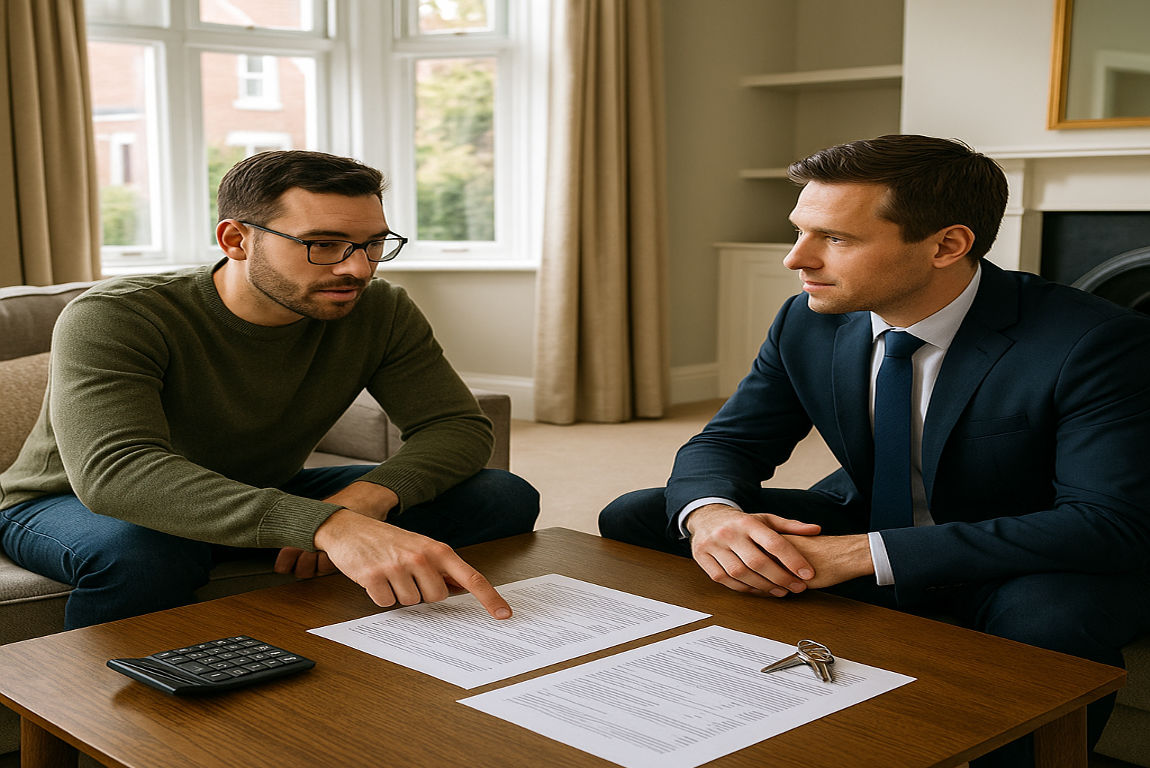Negotiating the price of a house can feel like a daunting task, especially in a competitive market like the UK. However, with the right strategies and preparation, you can save thousands of pounds and secure your dream home at a price that works for you.
The UK property market in 2025 remains dynamic, with fluctuating house prices influenced by economic conditions, interest rates, and regional demand. Whether you’re a first-time buyer or a seasoned investor, negotiation is a crucial skill that can significantly impact your property purchase.
By the end, you’ll have the tools and confidence to negotiate effectively and secure the best deal possible.
Understanding the UK House Buying Process

Before diving into negotiation tactics, it’s essential to understand the house-buying process in the UK. Here’s a step-by-step overview:
Step-by-Step Process
- Search for Properties: Use online portals like Rightmove or Zoopla to find homes that fit your criteria.
- Arrange Viewings: Visit properties to assess their condition and suitability.
- Make an Offer: This is where negotiation begins.
- Offer Accepted: Once the seller agrees, the property is taken off the market.
- Conveyancing: Solicitors handle the legal transfer of ownership.
- Survey and Valuation: A survey ensures the property is worth the agreed price.
- Exchange Contracts: Both parties sign legally binding contracts.
- Completion: The property officially becomes yours.
Where Negotiation Fits In
Negotiation typically happens after you’ve viewed the property and decided to make an offer. It’s your chance to agree on a price that reflects the property’s value and your budget.
Key Parties Involved
- Buyer: You, the person purchasing the property.
- Seller: The current owner of the property.
- Estate Agent: Represents the seller but can provide valuable insights.
- Solicitor: Handles the legal aspects of the transaction.
Why Negotiation Matters in the UK Property Market

Negotiation isn’t just about saving money—it’s about ensuring you’re paying a fair price for the property.
You may also read (how can i fix a hot room in my house).
Statistics on Negotiation Success
Did you know that over 70% of UK buyers negotiate on price and many successfully secure discounts of 5-10%? This can translate to savings of tens of thousands of pounds, depending on the property’s value.
Potential Savings
For example, on a £300,000 property, a 5% discount saves you £15,000. That money could go toward renovations, furniture, or other expenses.
Common Misconceptions
Many buyers believe that negotiation is rude or that the asking price is non-negotiable. In reality, sellers often expect buyers to negotiate, especially in a buyer’s market.
Risks of Not Negotiating
Failing to negotiate could result in overpaying for a property or missing out on opportunities to address issues such as repairs or upgrades.
Preparing to Negotiate: Research and Strategy

Preparation is key to successful negotiation. Here’s how to get ready:
A. Research the Local Market
- Check Sold Prices: Use tools like the Land Registry or property portals to see what similar homes have sold for recently.
- Understand Trends: Is it a buyer’s or seller’s market? Are properties selling quickly or sitting on the market?
- Compare Properties: Look at similar homes in the area to gauge whether the asking price is reasonable.
You may also read (can you legally sign your house).
Know Your Financial Position
- Mortgage in Principle: Secure this document to show sellers you’re serious and financially prepared.
- Budgeting: Factor in all costs, including stamp duty, legal fees, and surveys, to avoid overstretching your finances.
Assess the Property Thoroughly
- Viewing Tips: Look beyond the surface. Check for signs of dampness, structural issues, or outdated systems.
- Survey Reports: Use these to identify potential problems that could justify a lower offer.
Crafting Your Opening Offer
Your opening offer sets the tone for negotiations. Here’s how to get it right:
Deciding on Your Offer
- Start Low, But Not Too Low: A low offer can open the door to negotiation, but an unreasonably low bid might offend the seller.
- Use Evidence: Justify your offer with data, such as recent sale prices of similar properties.
Example Script
“Based on the condition of the property and recent sales in the area, I’d like to offer £X. I believe this is a fair starting point for discussions.”
Negotiation Tactics That Work in the UK

A. Present Yourself as an Attractive Buyer
- Chain-Free: Sellers prefer buyers who aren’t waiting to sell another property.
- Mortgage in Principle: Demonstrates your financial readiness.
Communicate Effectively
- Build Rapport: Be polite and professional with estate agents and sellers.
- Keep Your Budget Private: Don’t reveal your maximum budget upfront.
Strategic Counteroffers
- Responding to Rejections: If your offer is rejected, make a slightly higher, well-justified counteroffer.
- Know When to Walk Away: If the seller won’t budge, be prepared to move on.
Creative Negotiation Points
- Fixtures and Fittings: Request that appliances or furniture be included.
- Repairs: Request a price reduction for necessary repairs.
Common Mistakes to Avoid
- Revealing Your Budget: This can weaken your negotiating position.
- Getting Emotionally Attached: Stay objective to avoid overpaying.
- Ignoring Flaws: Use property issues as leverage.
- Not Getting Agreements in Writing: Always confirm terms in writing to avoid misunderstandings.
Special Scenarios: Negotiating in Different Market Conditions
Buyer’s Market vs Seller’s Market
- Buyer’s Market: More room for negotiation as sellers compete for buyers.
- Seller’s Market: Be prepared to act quickly and make strong offers.
New Builds vs Older Properties
- New Builds: Developers may offer incentives, such as upgrades or covering stamp duty.
- Older Properties: More room to negotiate on price, especially if repairs are needed.
Leveraging Professional Help
Professionals like buying agents, surveyors, and solicitors can strengthen your negotiating position. They provide expert advice and handle complex negotiations on your behalf.
Case Studies: Real-Life Negotiation Success Stories
First-Time Buyer in London
A first-time buyer negotiated a £20,000 discount by highlighting survey findings.
Family Buying a New Build
A family secured free upgrades and appliances by negotiating with the developer.
You may also read (a guide to purchasing a home).

